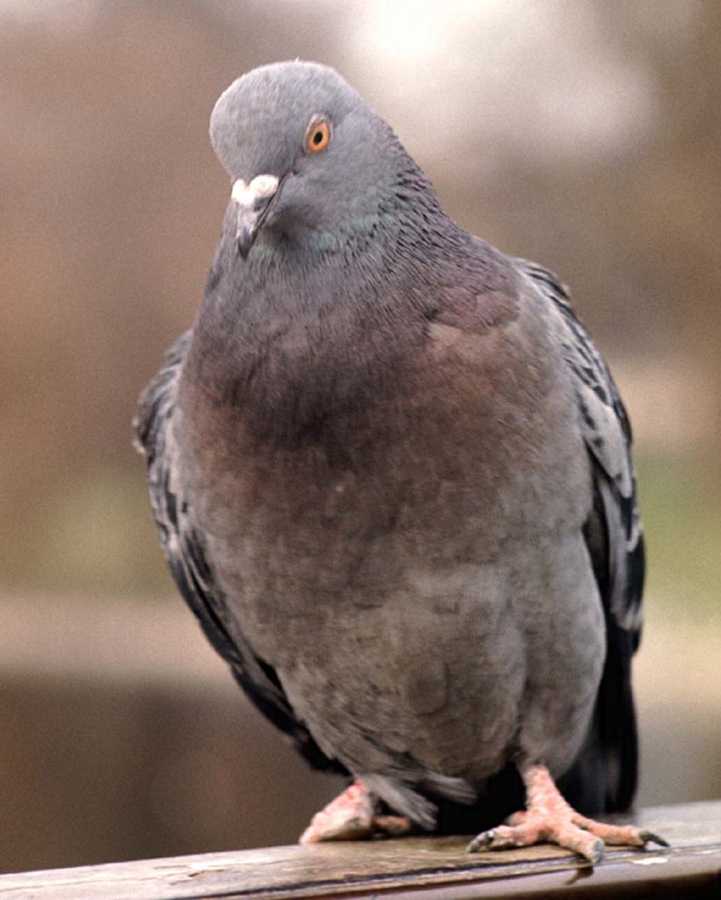
by Pigeon Patrol | Jul 20, 2023 | Bird Spike, Pigeon Droppings, Pigeon Patrol's Services, Pigeon Predators, Pigeon Spikes, Pigeons, Pigeons in the News
Chickens bob their heads while walking. So do cranes, magpies and quails. In fact, head bobbing is a unique feature in birds and occurs in at least 8 of the 27 families of birds.
There are a few theories why some birds bob their heads when they walk:
- Assists with balance
- Provides depth perception
- Sharpens their vision
However, most studies suggest that birds in motion bob their heads to stabilize their visual surroundings. In comparison, we rely more on our eye movements, not our head movements, to catch and hold images while in motion.
Picture a pigeon on a moving treadmill. What do you think would happen as the pigeon walks with the speed of the treadmill and its environment remains relatively the same? Dr. Barrie J Frost (1978) did this experiment and the pigeon’s head did not bob.
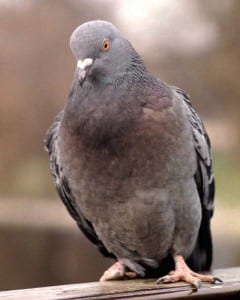
Dr. Mark Friedman (1975) also conducted a series of experiments to test the head bobbing actions of birds, using doves. His research demonstrated that the head movement is controlled more by visual stimulation than movement of the body.
Scientists continue to research head bobbing in birds. For example, scientists are currently investigating question such as “Why do some birds exhibit head bobbing, while other do not?” For more information on this topic see the related Web sites section.
Source
Pigeon Patrol Products & Services is the leading manufacturer and distributor or bird deterrent (control) products in Canada. Pigeon Patrol products have solved pest bird problems in industrial, commercial, and residential settings since 2000, by using safe and humane bird
deterrents with only bird and animal friendly solutions. At Pigeon Patrol, we manufacture and offer a variety of bird deterrents, ranging from Ultra-flex Bird Spikes with UV protection, Bird Netting, 4-S Bird Gel and the best Ultrasonic and audible sound devices on the market today.
Voted Best Canadian wholesaler for Bird Deterrent products ten years in a row.
Contact us at 1 877-4-NO-BIRD,(604) 585-9279 or visit our website at www.pigeonpatrol.ca
Pigeon/Pigeon Patrol / Pigeons Roosing / Vancouver Pigeon Control / Bird Spikes / Bird Control / Bird Deterrent / PIgeon Deterrent / Surrey Pigeon Control / Pest / Seagull deterrent / Vancouver Pigeon Blog / Birds Inside Home / Pigeons in the cities / Ice Pigeons / What to do about pigeons / sparrows, Damage by Sparrows, How to Keep Raccoons Away, Why Are Raccoons Considered Pests / De-fence / Pigeon Nesting / Bird Droppings / Pigeon Dropping / woodpecker control / Professional Bird Control Company / Keep The Birds Away / Birds/rats/seagull/pigeon/woodpecker/dove/sparrow/pidgeon control/pidgeon problem/pidgeon control/flying rats/pigeon problems/ bird netting/bird gel/bird spray/bird nails/bird guard
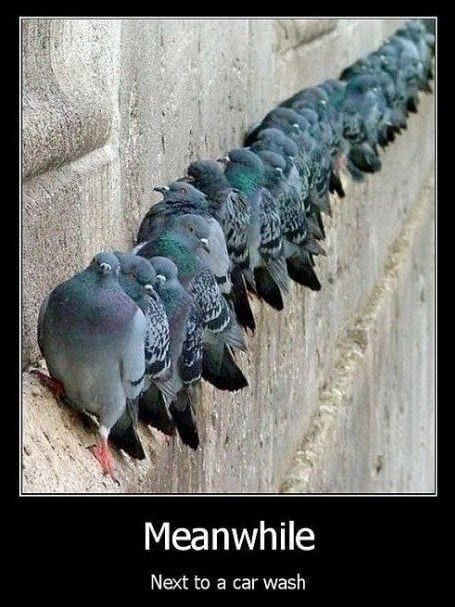
by Pigeon Patrol | Jul 20, 2023 | Bird Spike, Pigeon Predators, Pigeon Spikes, Pigeons, Pigeons in the News, Raccoons, Sparrows, UltraSonic Bird Control
Once used to deliver messages, these days pigeons are often reviled as urban pests.
The birds, common in major cities such as Paris and London, can often be seen struggling to walk due to missing toes and deformed feet.
Now a team of researchers in the French capital have come up with an interesting explanation for the phenomenon.
Previous research had suggested pigeons lose toes due to infections or chemical pollutants, but a new study by scientists from the National Museum of Natural History (MNHN) and the University of Lyon suggests that human hair may in fact be a culprit.
Study co-author Frédéric Jiguet, of MNHN, told CNN he came up with the idea for the study after noticing mutilated pigeons as he walked through the Jardin des Plantes, a botanical garden, in Paris.
“Pigeons have a very bad reputation in Paris, and actually everywhere in the world,” said Jiguet.
“People get confused, they think pigeons are dirty because they see them wandering about with stumps for legs, wandering through rubbish.”
However, the birds are actually “victims of our pollution, of our activities,” said Jiguet.
Researchers studied the extent of pigeon toe mutilations at 46 sites around the French capital.
Jiguet and the team found that toe mutilation “tended to increase with the density of hairdressers,” according to the study.
Jiguet said pigeons could lose digits which get stuck in human hair, a phenomenon known as “stringfeet.”
“When they walk, they can trip on strings or hair,” he said.
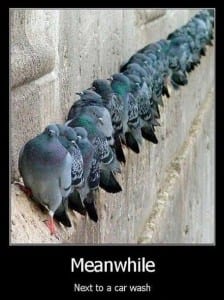
“The string might just fall, but sometimes it forms a knot around a toe, and in the end the toe dies and falls off.”
Pigeons also have fewer toes in areas with more air and noise pollution, providing a useful gauge for the quality of urban environments.
Jiguet said that the study showed “the more human activity in an area, the less toes pigeons have” and “the more green spaces, the more toes they have.”
“It would be interesting to look in all major cities in the world, to look at how many toes pigeons have in order to estimate the quality of the environment and of the pollution,” added Jiguet.
The study was published in the journal Biological Conservation.
Source
Pigeon Patrol Products & Services is the leading manufacturer and distributor or bird deterrent (control) products in Canada. Pigeon Patrol products have solved pest bird problems in industrial, commercial, and residential settings since 2000, by using safe and humane bird
deterrents with only bird and animal friendly solutions. At Pigeon Patrol, we manufacture and offer a variety of bird deterrents, ranging from Ultra-flex Bird Spikes with UV protection, Bird Netting, 4-S Bird Gel and the best Ultrasonic and audible sound devices on the market today.
Voted Best Canadian wholesaler for Bird Deterrent products ten years in a row.
Contact us at 1 877-4-NO-BIRD,(604) 585-9279 or visit our website at www.pigeonpatrol.ca
Pigeon/Pigeon Patrol / Pigeons Roosing / Vancouver Pigeon Control / Bird Spikes / Bird Control / Bird Deterrent / PIgeon Deterrent / Surrey Pigeon Control / Pest / Seagull deterrent / Vancouver Pigeon Blog / Birds Inside Home / Pigeons in the cities / Ice Pigeons / What to do about pigeons / sparrows, Damage by Sparrows, How to Keep Raccoons Away, Why Are Raccoons Considered Pests / De-fence / Pigeon Nesting / Bird Droppings / Pigeon Dropping / woodpecker control / Professional Bird Control Company / Keep The Birds Away / Birds/rats/seagull/pigeon/woodpecker/dove/sparrow/pidgeon control/pidgeon problem/pidgeon control/flying rats/pigeon problems/ bird netting/bird gel/bird spray/bird nails/bird guard
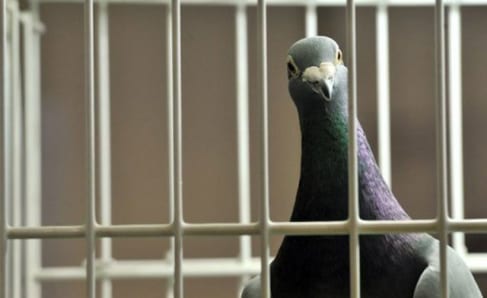
by Pigeon Patrol | Jul 20, 2023 | Bird Spike, Pigeon Predators, Pigeon Spikes, Pigeons, Pigeons in the News, Raccoons, Sparrows, UltraSonic Bird Control
Sick of sea gulls? Petrified of pigeons? Bothered by birds? Have you been stepping in excessive amounts of bird poo around your home or business?
This guide is packed full of everything you need to know about bird management in the UK. The guide includes why we sometimes have to control birds, how to deter birds, and how to get rid of them if you have an infestation.
Whether you’re thinking about doing some DIY bird control or you’re looking to enlist the help of a professional bird management company, this guide is for you.
We love British birds. Every wild bird and their eggs in the UK is rightfully protected by law under the Wildlife and Countryside Act 1981.
There are hundreds of species of birds in the UK. Having birds visit your garden is a wonderful treat, and we’re all happy to see them.
Unfortunately, a few species of birds come into direct conflict with humans when they take roost in or around our homes or businesses. These birds can cause real problems, including excessive nuisance and public health concerns.
Urban birds such as gulls and pigeons are great opportunists. Handed a ready food source and sheltered nesting site, these birds can grow rapidly and what initially attracted a few birds can soon become a thriving colony.
That’s when a professional can step in and help you control and manage pest birds.
The dangers: why control birds?
Pathogens and diseases
There are more than 110 pathogens reportedly carried by pigeons, and there is plenty of research to suggest other wild birds pass on diseases to humans.
Some of the more common diseases and pathogens that birds can spread:
| Air-borne diseases |
Food-borne disease |
| Chlamydia psittaci (Ornithosis) |
Salmonella spp. |
| Cryptococcus neoformans |
Escherichia coli |
| Histoplasma capsulatum |
Campylobacter jejuni |
| Allergenic particles (bird fancier’s lung) |
Listeria monocytogenes |
|
Vibrio cholerae |
In 2019, two patients died in a Glasgow hospital who had contracted a cryptococcal fungal infection which was subsequently linked to pigeon droppings.
Diseases can be transmitted from bird droppings and the birds themselves.
When dry, pigeon droppings can become airborne in small particles, which can lead to respiratory complaints.
You should always wear appropriate personal protective equipment (PPE) when cleaning up bird droppings.
Food-borne bacteria can be spread to humans if you have poor food hygiene standards or come into direct contact with droppings (wash your hands straight away)!
Pigeons, gulls, house sparrows and starlings have the potential to carry food-borne diseases – it is therefore essential to keep them away from food manufacturers and distributors.
Safety concerns
All bird droppings can be slippery and can cause a serious risk on pavements, particularly under roosting birds.
As funny as it might seem to see a gull steal someone’s chips at the seaside, gulls can pose a serious safety concern.
During the breeding season, gulls have been known to attack people unprovoked. Gulls have the potential to startle and even draw blood when they attack.
All birds have the potential to cause real problems on airfields. When birds are sucked into plane engines (bird strikes) – while rarely fatal – they can cause damage to aircraft and emergency landings.
Damage to property and brickwork
Bird droppings are acidic and can corrode and erode metals, stonework and brickwork.
Nesting materials birds use can block chimneys, flues and guttering, causing possible issues with carbon monoxide and damage to buildings as water overflows from blocked gutters.
Buildings covered in fouling looks unpleasant, can smell, and projects a poor image of a business, potentially ruining an organisation’s reputation. If customers spot evidence of a bird infestation on your premises, they may not want to do business with you.
A professional pest management company can help protect your building using proofing and bird deterrent measures.
Secondary insect infestations
Where birds go, so too go the parasites that live on them. Bird mites, ticks, fleas and beetles can all cause complicated secondary infestations.
If you have a current or past problem with birds, you may find you’ll suffer from a parasite infestation too.
These little critters can quickly multiply into thousands, leaving you feeling overwhelmed.
The relentless biting, itching, crawling sensation and lack of sleep are the physical symptoms that can propagate a whole host of secondary mental health issues.
Bird mites are parasitic arthropods feed on living organisms. It is the female mite that needs a blood meal to reproduce viable eggs. They are attracted to mammals by receptors for moisture, heat and CO2, and they often bite humans when their original food source has gone – like when the young birds leave the nest.
If you have a parasite issue because of a bird infestation, contact a professional pest management company as soon as possible.
Birds around businesses
If you have birds roosting in and around your business then you’ll want to seek professional help as soon as possible.
In the UK, allowing birds to infest a food business violates the Food Safety (General Food Hygiene) Regulations 1995, and could result in prosecution of the food company.
If you don’t address health and safety hazards, you could be putting your staff and customers at risk.
By investing in a professional bird management contract, you can save money in the long run by reducing damage to your property or stock.
The reputational damage caused by a bird infestation can be catastrophic. Bird droppings make any business appear unclean and imply a state to disrepair.
Would you choose to use a company covered in dangerous poo?
Find a professional to help stop bird infestations at your work and protect your business today.
Birds control licences and the law
The Wildlife and Countryside Act 1981 protects all wild birds, their nests and eggs.
However, specific exemptions permit certain species to be controlled by particular methods for specific reasons.
This exemption is given in the way of a wildlife licence issued by Natural England, Natural Resources Wales, Scottish Natural Heritage or Department of Agriculture, Environment and Rural Affairs.
General licences are issued to allow certain actions to be carried out that would otherwise be illegal under the legislation, without the need for people to apply for a specific licence.
Individual licences are sometimes granted for specific situations not covered by a general license. These do need to be applied for.
The law only allows competent people such as professional pest controllers to deal with certain species.
You should always consult with a professional before you consider any form of bird control measures, as the list of birds that are considered pests can change regularly.
You can be prosecuted in the UK if you illegally interfere with a bird, it’s nests or eggs and you’re not doing under a wildlife licence.
Signs of a bird infestation
What do you need to look out for to spot a bird infestation? Some bird species like pigeons and gulls have adapted to live around us.
By their nature, birds will normally be at height keeping away from us.
Here are the seven signs that you have a bird problem:
- Spotting lots of birds settling on roofs or ledges
- Loud bird noises and cries from young chicks
- Finding nesting materials thrown about your home of business
- Damaged stock from pecking
- Bird fouling/droppings
- Blocked guttering and drainage systems with feathers and nest materials
- Secondary infestations from bird parasites (such as bird mites).
Types of birds that can be a pest
While most species of birds coexist with humans and rarely come into conflict with us, some species of birds in certain situations are considered pests.
It’s important to note that even species typically considered “pest birds” are protected by law.
Control of feral pigeon (Columba livia)
The feral pigeon is a widespread pest bird found in cities, towns and rural settings in the UK and around the world.
Pigeons can harbour a large variety of diseases and insects on their bodies. Its nests and fouling are also public health concerns.
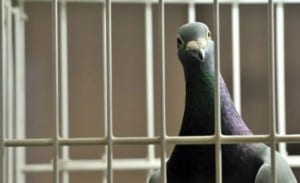
Biology of a pigeon
Feral pigeons originally descended from domesticated rock doves. The population is supported by escaped racing pigeons.
Pigeons usually make their nests in bridges, buildings or any structures with easily accessible shelter.
Males and females help build nests out of grass, twigs, features and even litter such as plastics and wire. The nests can be quite large and quickly become thick with droppings.
Depending on breeding conditions, pigeons can have up to seven broods (birds produced at one hatching) in their breeding season between March and July.
Two eggs hatch in around 18 days. With access to enough food, the young pigeons will become independent adults in just 30 days.
More eggs can be hatched before the young have even left the nest, meaning a population can quickly grow.
Wild pigeons will live up to four years, relying on human food scraps and spillages, or taking from newly sown farmland.
Behaviour of a pigeon
You’ll often see pigeons in town centres feeding in huge flocks, ranging in size from 50 to 400-plus birds.
Pigeons have a social order, so the more dominant birds feed first and get the best breeding sites.
Management and control of pigeons
The best way to get rid of pigeons is to remove a food source.
Cover bins, clean up spillages and restrict access to food. Most importantly – don’t feed the pigeons!
Proofing with nets, spikes and mesh can stop pigeons perching and roosting in structures.
Scaring techniques rarely work with pigeons. Visual and audio scaring doesn’t tend to work very well or for very long. Pigeons adapt very quickly to new things.
Flying birds of prey regularly can be useful.
Lethal control can be an option when a bird has entered a food premises or overcome the proofing measures.
Culling pigeons to reduce flock sizes is rarely successful unless access to food is restricted, otherwise population numbers soon recover. This should only ever be done as a last resort and in accordance with a wildlife licence (general or individual) issued by an appropriate government department.
How to prevent and deter birds
All urban birds require is:
- A nesting/ roosting sites (eg balconies, window ledges and roof areas of surrounding buildings)
- A reliable food source.
Removing bird food sources or blocking off sites where they perch or roost is the best way to prevent birds causing a problem.
The number of birds attracted to an area will depend on what food is available.
All of these methods of proofing have their merits and some can offer a stronger and more lasting deterrent, but as with any method of control, they may become less effective over an extended period of time.
Flying a bird of prey can be a great way of deterring birds from a certain area.
For a heavy bird infestation, your professional contractor may have to employ methods of control such as egg and nest removal, shooting, trapping or flying of predatory birds.
Therefore if birds are being fed, more will be attracted to that area, so food sources must be kept to a minimum. Keep your bin lids closed and cover compost bins.
Source
Pigeon Patrol Products & Services is the leading manufacturer and distributor or bird deterrent (control) products in Canada. Pigeon Patrol products have solved pest bird problems in industrial, commercial, and residential settings since 2000, by using safe and humane bird
deterrents with only bird and animal friendly solutions. At Pigeon Patrol, we manufacture and offer a variety of bird deterrents, ranging from Ultra-flex Bird Spikes with UV protection, Bird Netting, 4-S Bird Gel and the best Ultrasonic and audible sound devices on the market today.
Voted Best Canadian wholesaler for Bird Deterrent products ten years in a row.
Contact us at 1 877-4-NO-BIRD,(604) 585-9279 or visit our website at www.pigeonpatrol.ca
Pigeon/Pigeon Patrol / Pigeons Roosing / Vancouver Pigeon Control / Bird Spikes / Bird Control / Bird Deterrent / PIgeon Deterrent / Surrey Pigeon Control / Pest / Seagull deterrent / Vancouver Pigeon Blog / Birds Inside Home / Pigeons in the cities / Ice Pigeons / What to do about pigeons / sparrows, Damage by Sparrows, How to Keep Raccoons Away, Why Are Raccoons Considered Pests / De-fence / Pigeon Nesting / Bird Droppings / Pigeon Dropping / woodpecker control / Professional Bird Control Company / Keep The Birds Away / Birds/rats/seagull/pigeon/woodpecker/dove/sparrow/pidgeon control/pidgeon problem/pidgeon control/flying rats/pigeon problems/ bird netting/bird gel/bird spray/bird nails/bird guard
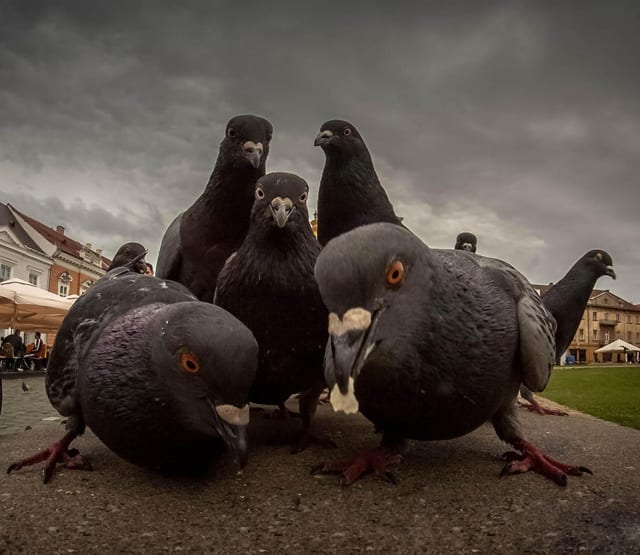
by Pigeon Patrol | Jul 6, 2023 | Bird Spike, Pigeon Predators, Pigeon Spikes, Pigeons, Pigeons in the News, Raccoons, Sparrows, UltraSonic Bird Control
A number of pigeons found dead in traps along SkyTrain routes in Vancouver have sparked concern from the public, but the pest control company that runs these traps says it has nothing to do with neglect.
Commuter Zahra Ahmdz started a petition against transit operator TransLink in the summer of 2021 after noticing the traps inside the Stadium-Chinatown station on her way to work, and what she said was very clearly multiple dead pigeons inside.
“It was very, very shocking. I didn’t think this would happen in Canada,” she said.
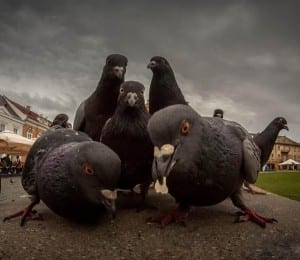
The traps are one of several methods TransLink uses to control the population of pigeons at SkyTrain stations, but the birds are never supposed to die inside. TransLink hires a pest control company to check the traps once a week, ensure there is adequate food and water inside and humanely kill any birds captured.
Media relations advisor Thor Diakow said it’s possible some pigeons did die inside the cages last summer, as TransLink was between pest control companies and didn’t maintain the cages itself in the meantime.
Ahmdz said the problem didn’t stopped there though.
Photos she said she took in March and May appear to show more dead pigeons inside the cages. And Ahmdz said after she complained to TransLink and the BC SPCA, small barriers were erected making it more difficult for her to see the birds.
“This is cruelty,” Ahmdz said.
Pest control company claims no neglect
The pest control company in charge of the cages disagrees. Atlas Pest And Wildlife Control has been working for TransLink since around November or December 2021, according to its president Raymond Arthurs. He readily admitted that they sometimes find pigeons dead inside the cages during their weekly checks, but said it’s not because of neglect on their part.
“Sometimes a hawk will get inside and kill them,” Arthurs said. “That’s kind of all natural.”
As for the barriers, Arthurs said they’re partially to stop people from tampering with the cages and partially to protect the birds from water dripping from the ceiling or other elements.
He said if the weather drops below zero, they leave the cages open as they know the water bowls inside will freeze over. They don’t have a system in place yet for hot weather, as they haven’t worked a summer for TransLink yet, Arthurs added.
He said he couldn’t comment on the exact number of pigeons that have died in his company’s cages. They keep weekly records of their activities, but Arthurs said only TransLink can decide who to provide them to. TransLink agreed to give them to Black Press Media, but said they weren’t available at the time of publication.
A move toward birth control
Both emphasized that they are starting to move away from traps and towards birth control methods.
The BC SPCA pushed TransLink to pilot test OvoControl birth control in several stations for 18 months in 2019 and 2020 after similar complaints about trapped pigeons were brought forward.
BC SPCA chief scientific officer Sara Dubois said the results were exactly what they expected – the population stabilized. She said she was disappointed when TransLink chose not to continue with the long-term solution.
More than a year later though, Diakow said TransLink is now recommitting to the method and will have permanent OvoControl dispensers in some SkyTrain stations come summer.
TransLink also uses bird spikes, netting and low-charge electric strips to deter pigeons from roosting in stations. Diakow said their main concern is the potential for bacterial infections from the birds’ droppings, but that pigeons are also one of a number of animals that regularly set off TransLink’s highly sensitive intrusion alarms.
In 2021, Diakow said wildlife set off the alarms 544 times, resulting in between 12 and 20 hours of transit delays. He said it’s impossible to know how many pigeons alone were responsible for.
Feeding wildlife is feeding the problem
He and Dubois said a large part of the problem is people drawing the pigeons to the stations.
“There’s these regulars that always show up and feed the birds,” Diakow said.
Often times, he said they do so just off TransLink property, so staff can’t actually do anything about it.
Dubois said she’s hopeful Vancouver’s new bylaw banning feeding wildlife in city parks could help, though. She said she’d like to see TransLink work with bylaw on solutions.
Diakow said they’re looking into putting up signage at the stations.
Source
Pigeon Patrol Products & Services is the leading manufacturer and distributor or bird deterrent (control) products in Canada. Pigeon Patrol products have solved pest bird problems in industrial, commercial, and residential settings since 2000, by using safe and humane bird
deterrents with only bird and animal friendly solutions. At Pigeon Patrol, we manufacture and offer a variety of bird deterrents, ranging from Ultra-flex Bird Spikes with UV protection, Bird Netting, 4-S Bird Gel and the best Ultrasonic and audible sound devices on the market today.
Voted Best Canadian wholesaler for Bird Deterrent products ten years in a row.
Contact us at 1 877-4-NO-BIRD,(604) 585-9279 or visit our website at www.pigeonpatrol.ca
Pigeon/Pigeon Patrol / Pigeons Roosing / Vancouver Pigeon Control / Bird Spikes / Bird Control / Bird Deterrent / PIgeon Deterrent / Surrey Pigeon Control / Pest / Seagull deterrent / Vancouver Pigeon Blog / Birds Inside Home / Pigeons in the cities / Ice Pigeons / What to do about pigeons / sparrows, Damage by Sparrows, How to Keep Raccoons Away, Why Are Raccoons Considered Pests / De-fence / Pigeon Nesting / Bird Droppings / Pigeon Dropping / woodpecker control / Professional Bird Control Company / Keep The Birds Away / Birds/rats/seagull/pigeon/woodpecker/dove/sparrow/pidgeon control/pidgeon problem/pidgeon control/flying rats/pigeon problems/ bird netting/bird gel/bird spray/bird nails/bird guard
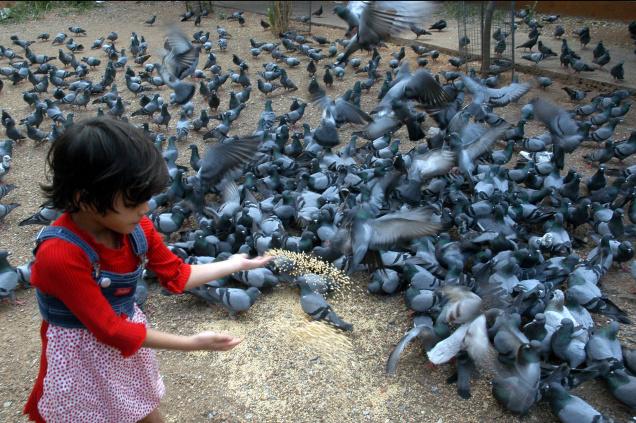
by Pigeon Patrol | Jul 6, 2023 | Bird Spike, Pigeon Spikes, Pigeons, Pigeons in the News, Raccoons, Sparrows, UltraSonic Bird Control
People often have no previous experience with pigeons or bird rescue. They did not wake up in the morning expecting to cross paths with a pigeon, but then an unexpected guest lands in their backyard, or on their roof, and it seems like something other than a random city pigeon. Perhaps it has an unusual appearance, or bands on its legs, perhaps it is alone with no flock, perhaps it seems weak or unable to fly. There’s no doubt that this is a pigeon in need of help, either because it is ill, starving, or a domestic breed lacking in survival skills. Pigeons and doves are preyed upon by hawks, ravens, gulls, cats, raccoons, rats, and more and, if you can catch the bird, she needs to be caught.
But how to catch?
First, rest assured that catching a pigeon is indeed possible, and safe- for both the bird and for you. Your catching the bird will be a lot safer for her than if a predator catches her. You will not scare a pigeon to death or give her a heart attack. And pigeons are harmless to us. They can’t really bite (no teeth and their beak is soft and weak) and, contrary to popular belief, you are highly unlikely to ever be made sick by a pigeon. There are very few diseases that you can catch from them and you are far, far more likely to get sick from a dog or cat (or be struck by lightning, actually). Simple soap-and-water hand washing after handling any animal can reduce the chances of illness to near zero.
So, let’s catch the pigeon!
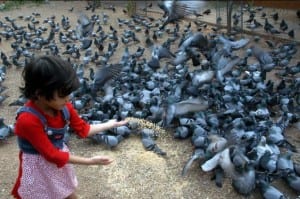
There are a few different methods that have a good success rate. Much will depend on what you are most comfortable with and what kind of shape the pigeon is in.
The first and easiest method is simply to scoop the pigeon up in your hands. People often tell us that they have found a pigeon that seems exceptionally tame and friendly and allowed itself to be picked up. If you can just pick it up, though, there’s a good chance that the pigeon is in real trouble. It may be starving, dehydrated, and/or injured.
A bird that tries to get away from you, but is weak or unable to fly, can often be walk-herded into a corner or inside through an open door and then caught (by hand or with a blanket, towel, or sweater). Drop the cloth over the bird and gently pick it up inside the cloth. Make sure the bird’s wings are folded against its sides, and hold it so that your hands encircle the wings and body, to prevent panicked flapping. A bird in this condition will likely need to be assessed by an expert.
Is your visitor lively? Flies away when you get too close? It’s good to see a strong and healthy pigeon, but this will present a challenge in actually getting your hands on the bird. The method that most often succeeds in catching a bird that is unwilling to be caught, is the crate-and-string method. You’ll need a cage or crate of some kind — a black wire dog crate works well. Put seeds and water deep in the center of the cage (beyond the reach of a clever bird who pokes her head in from the sides or back), and a thin trail of seeds leading up to the cage door (not too much, the bird needs to be hungry to risk entering what they know is a trap). Pigeons are especially fond of chopped peanuts and safflower seeds, but an ordinary bird seed mix for either pet or wild birds will work. Even rice -cooked or raw- can work in a pinch (there is a persistent myth that rice is harmful for birds, but it’s actually fine to use) or dry lentils, quinoa, crushed cereal, etc. will work for a hungry bird.
You’ll want to tie a long piece of string to the cage door in such a way as, when you pull it, the door pulls closed, and then sit at some distance, with the string in your hand. You might need to be out of the bird’s line of vision if it is particularly skittish. Eventually the bird should enter the cage to get the food, at which point you will pull on the string to close the door. Be patient. This can take some time (days even, just leave the door open when you’re not around & only put food inside so they have to go in) but is a very reliable and bird-friendly method. If the pigeon panics after the door is closed and starts thrashing around, cover the crate with a blanket to help calm her and bring the crate and bird indoors to safety. (You can’t leave her outside as predators can do terrible damage to an unsafely confined bird.) And don’t feel badly about having caught her. You most likely just saved her life and she’ll calm down.
Another method for catching a healthy unwilling pigeon is what we call the Wile E. Coyote box trap. Take a medium size box or laundry basket, turn it upside down and prop up one end with a stick. Place food and water underneath the box, with a trail leading up to it. Tie a string to the bottom part of the stick, and sit at a distance away with the other end of the string in your hand. When the pigeon ventures under the box to get the food, pull the string to remove the stick, and the box will fall, trapping the pigeon underneath.
You will at this point need to carefully reach underneath the box to get the pigeon. You won’t be able to see what you’re doing, because if you lift the box too high the pigeon will escape. You might try putting a big blanket over the box and yourself, while you try to catch the pigeon. Your neighbors will wonder about you. But it can work.
You can also buy or create a humane trap with a one-way door so that once they’ve gone in, they can’t get back out. (Monitor the trap closely though and do not leave out unsupervised or overnight. Once trapped, the bird will attract and be terribly vulnerable to predators including rats, cats, hawks, raccoons, ravens, gulls, dogs, etc.)
A third method for catching a pigeon is to find where it is roosting at night. Pigeons have very poor night vision, and tend to hold still in the dark if they sense danger approaching, hoping that it passes them by. You may be able to climb a ladder and grab the pigeon with your hands. This works best if done in the dark so turn lights off and let your eyes adjust (yours will, the pigeon’s won’t). Then very quietly and without hesitation, grab the bird with both hands around the body. Be prepared for her to startle and try to get away. Don’t let go and make that first grab count because if she gets away, she’ll risk flying off even in the dark.
The final method is one that takes a bit of practice, plus good reflexes and careful timing. It is best used on a pigeon that is hanging out with a wild flock, and it’s the method that we use for “destringing” work, when we are trying to catch wild pigeons who are suffering from injuries to their feet caused by string and debris wrapped around their toes (ever wondered why city pigeons often have missing toes or deformed feet? Now you know!) With this method, you’ll spread a generous amount of food on the ground, in a line that measures three or four inches wide and about a foot and a half long. Stand fairly close to the food with your feet spread a distance apart. The pigeons should approach and cluster around, trying to eat as much as possible and certainly more than the pigeons on either side of them. They will be eyeing the food and each other, while you stand nearby, periodically sprinkling more food. Keep your eye on the pigeon you want to catch. Slowly advance until your open hand is hovering, palm down, immediately above the pigeon, then, in one swift motion, drop your hand down, pinning the bird to the ground. It really helps to practice this multiple times, using a shoe or a loaf of bread in place of the pigeon. You’re going to be going very quickly from a standing to a crouching or lunging position, and you don’t want to topple over, so practice the motion until you feel confident.
If you try and miss, the pigeons may scatter and be skittish for a time, but overcoming their caution is sometimes just a matter of moving the food to a slightly different location. You usually get multiple chances. This is not because pigeons are stupid (they are not), but because pigeons are more trusting than most birds (and very hungry). Despite a long history of mistreatment at the hands of human beings, their species, in general, has a benevolent view of ours.
Once caught, you must bring the bird indoors to safety. The vast majority of cages are made only to confine a bird indoors and are not at all safe outside. Leaving a bird outdoors in an indoor cage is basically creating a foraging toy for predators. Hawks, raccoons, cats, rats can all do terrible damage to an unsafely caged bird, right through the bars. Once safely indoors, you need to find a pigeon-friendly expert to help you assess the bird. Many are in critical condition by the time they are caught but recognizing that and supporting them through it takes knowledge and experience.
Source
Pigeon Patrol Products & Services is the leading manufacturer and distributor or bird deterrent (control) products in Canada. Pigeon Patrol products have solved pest bird problems in industrial, commercial, and residential settings since 2000, by using safe and humane bird
deterrents with only bird and animal friendly solutions. At Pigeon Patrol, we manufacture and offer a variety of bird deterrents, ranging from Ultra-flex Bird Spikes with UV protection, Bird Netting, 4-S Bird Gel and the best Ultrasonic and audible sound devices on the market today.
Voted Best Canadian wholesaler for Bird Deterrent products ten years in a row.
Contact us at 1 877-4-NO-BIRD,(604) 585-9279 or visit our website at www.pigeonpatrol.ca
Pigeon/Pigeon Patrol / Pigeons Roosing / Vancouver Pigeon Control / Bird Spikes / Bird Control / Bird Deterrent / PIgeon Deterrent / Surrey Pigeon Control / Pest / Seagull deterrent / Vancouver Pigeon Blog / Birds Inside Home / Pigeons in the cities / Ice Pigeons / What to do about pigeons / sparrows, Damage by Sparrows, How to Keep Raccoons Away, Why Are Raccoons Considered Pests / De-fence / Pigeon Nesting / Bird Droppings / Pigeon Dropping / woodpecker control / Professional Bird Control Company / Keep The Birds Away / Birds/rats/seagull/pigeon/woodpecker/dove/sparrow/pidgeon control/pidgeon problem/pidgeon control/flying rats/pigeon problems/ bird netting/bird gel/bird spray/bird nails/bird guard
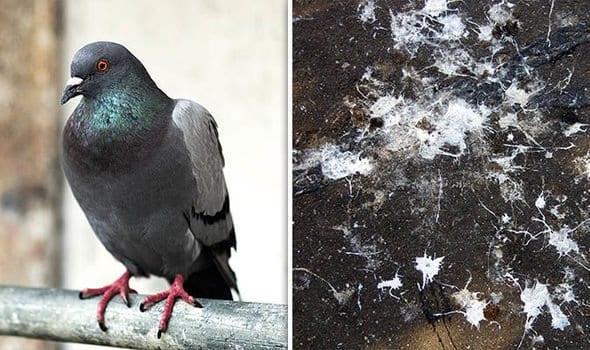
by Pigeon Patrol | Jun 30, 2023 | Bird Spike, Pigeon Predators, Pigeon Spikes, Pigeons, Pigeons in the News, Raccoons, Sparrows, UltraSonic Bird Control
If you don’t want pigeons nesting around your property, there are a number of ways you can scare them off when it looks like they might be getting comfortable.
Spray With Water
A great way to scare pigeons away without causing them any harm is to spray them with the garden hose. It’s highly unlikely they’ll appreciate getting drenched so you can guarantee they won’t hang around for long.
It’s important to do this when the birds first arrive so they know this isn’t a comfortable place to set up home. If you wait until they’ve set up a roost, not even a good soaking will get them to budge.
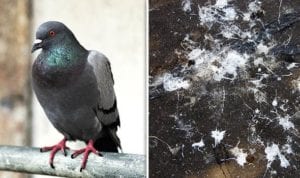
Install Scare-Pigeons
These lightweight kites are usually sold in the form of hawk silhouettes and when placed where pigeons usually roost, they’re a great scare tactic. A good tip is to move the decoy on a regular basis because pigeons will get used to its presence and won’t be scared of it anymore – especially because it doesn’t make a noise.
Use Reflective Surfaces
When the sun hits a reflective object, it creates a prism effect which interferes with pigeons’ eyesight. If your roof, balcony or windowsills are covered with anything from reflective tape to foil balloons, it’s highly unlikely they will settle. Another great way to deter pigeons from settling around your property is to hang old CDs from nearby trees or along awnings.
Install Sloped Sheathing
To keep pigeons off ledges and other flat surfaces, cover them with a sloping piece of sheet metal. If they physically can’t settle somewhere then they won’t.
When To Call A Pest Controller
The best way to deal with a pigeon problem is to call a pest controller. They will know exactly how to get rid of them and importantly, how to keep them away for good.
Pest control companies are well training on what systems to install to provide the best solution to your problem. From installing a netting system to anti-pigeon spikes, or wire systems on window ledges and leading edges.
What Won’t Work
There are many myths surrounding pigeons and how to scare them away but unfortunately, most of them are a waste of time because they simply don’t work.
- Noises – Everyone assumes that loud noises will scare these birds away but if you consider the pigeon population of London, it’s evident that this simply isn’t true. Pigeons are city birds – they’re used to loud noises and they don’t startle easily so unfortunately, no amount of noise is likely to drive them away.
- Ultrasonic Noises – Ultrasonic noise may seem like a great way to scare off pigeons but sadly, this method doesn’t work either. Ultrasonic sound waves bounce off objects, creating spots where pigeons can completely avoid the sound. Not only will you still be faced with a pigeon problem, these devices can also damage the hearing of cats and dogs.
- Ignoring the problem – Sadly burying your head in the sand won’t make these pests go away. Once they have found an Idyllic home location they will settle for life, so If left untreated the population will grow and grow, and so will the impact on your premises and surrounding area
Source
Pigeon Patrol Products & Services is the leading manufacturer and distributor or bird deterrent (control) products in Canada. Pigeon Patrol products have solved pest bird problems in industrial, commercial, and residential settings since 2000, by using safe and humane bird
deterrents with only bird and animal friendly solutions. At Pigeon Patrol, we manufacture and offer a variety of bird deterrents, ranging from Ultra-flex Bird Spikes with UV protection, Bird Netting, 4-S Bird Gel and the best Ultrasonic and audible sound devices on the market today.
Voted Best Canadian wholesaler for Bird Deterrent products ten years in a row.
Contact us at 1 877-4-NO-BIRD,(604) 585-9279 or visit our website at www.pigeonpatrol.ca
Pigeon/Pigeon Patrol / Pigeons Roosing / Vancouver Pigeon Control / Bird Spikes / Bird Control / Bird Deterrent / PIgeon Deterrent / Surrey Pigeon Control / Pest / Seagull deterrent / Vancouver Pigeon Blog / Birds Inside Home / Pigeons in the cities / Ice Pigeons / What to do about pigeons / sparrows, Damage by Sparrows, How to Keep Raccoons Away, Why Are Raccoons Considered Pests / De-fence / Pigeon Nesting / Bird Droppings / Pigeon Dropping / woodpecker control / Professional Bird Control Company / Keep The Birds Away / Birds/rats/seagull/pigeon/woodpecker/dove/sparrow/pidgeon control/pidgeon problem/pidgeon control/flying rats/pigeon problems/ bird netting/bird gel/bird spray/bird nails/bird guard












